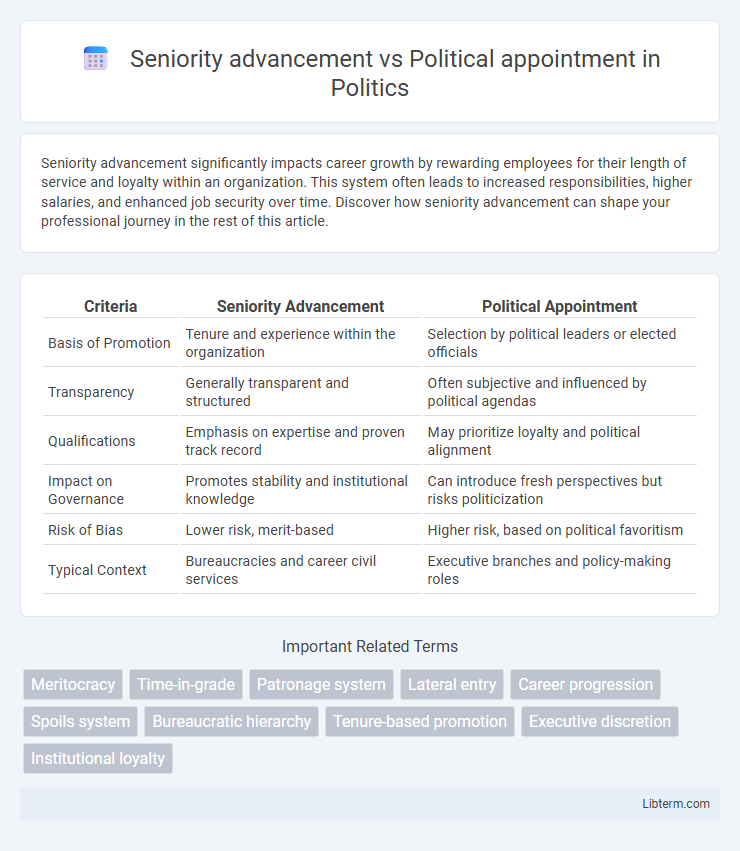Seniority advancement significantly impacts career growth by rewarding employees for their length of service and loyalty within an organization. This system often leads to increased responsibilities, higher salaries, and enhanced job security over time. Discover how seniority advancement can shape your professional journey in the rest of this article.
Table of Comparison
| Criteria | Seniority Advancement | Political Appointment |
|---|---|---|
| Basis of Promotion | Tenure and experience within the organization | Selection by political leaders or elected officials |
| Transparency | Generally transparent and structured | Often subjective and influenced by political agendas |
| Qualifications | Emphasis on expertise and proven track record | May prioritize loyalty and political alignment |
| Impact on Governance | Promotes stability and institutional knowledge | Can introduce fresh perspectives but risks politicization |
| Risk of Bias | Lower risk, merit-based | Higher risk, based on political favoritism |
| Typical Context | Bureaucracies and career civil services | Executive branches and policy-making roles |
Understanding Seniority Advancement
Seniority advancement in organizations is based on tenure and accumulated experience, reflecting a structured and transparent promotion system that rewards loyalty and proven expertise. This approach ensures employees with consistent performance and institutional knowledge gain leadership roles, fostering stability and long-term skill development. Unlike political appointments, seniority advancement minimizes bias by prioritizing merit and experience over external influence or favoritism.
Defining Political Appointment
Political appointment refers to the process by which government officials are selected based on political affiliation, loyalty, or support rather than solely on experience or seniority. Unlike seniority advancement, which relies on tenure and proven expertise within an organization, political appointments prioritize alignment with the current administration's agenda. These appointments can influence policy direction and administrative priorities, often leading to shifts in organizational leadership aligned with political objectives.
Key Differences Between Seniority and Political Appointments
Seniority advancement is based on tenure and experience within an organization, ensuring promotions are earned through years of service and demonstrated competence. Political appointments, however, rely on affiliations, loyalty, or alignment with current political leadership, often prioritizing strategic or policy goals over experience. This fundamental difference impacts organizational stability, with seniority promoting consistency and political appointments introducing shifts aligned with prevailing political objectives.
Historical Context of Seniority Advancement
Seniority advancement in political systems is rooted in historical traditions where experience, tenure, and institutional knowledge determined leadership roles and committee assignments, particularly in legislative bodies like the U.S. Congress. This method prioritized long-term service and continuity, fostering expertise and stability in governance structures over time. Political appointment, by contrast, emerged as a mechanism for leaders to place trusted allies in key positions, often bypassing seniority in favor of loyalty or strategic interests.
The Role of Political Influence in Appointments
Political influence plays a crucial role in appointments, often overriding seniority advancement to position favored candidates within government and organizational hierarchies. This dynamic can lead to the selection of individuals based on loyalty or political agendas rather than merit or experience, impacting institutional effectiveness and morale. The balance between seniority and political appointment shapes leadership structures, reflecting broader power dynamics and governance priorities.
Pros and Cons of Seniority-Based Promotion
Seniority-based promotion ensures a clear, objective career progression for employees by recognizing experience and loyalty, which fosters stability and reduces bias. However, it may limit innovation and adaptability by promoting individuals based on tenure rather than current performance or merit. This approach can sometimes hinder the infusion of fresh ideas and reduce organizational dynamism in rapidly changing environments.
Benefits and Drawbacks of Political Appointments
Political appointments offer the benefit of placing individuals with aligned visions and expertise directly into strategic positions, enabling swift policy implementation and enhanced executive control. However, drawbacks include potential cronyism, lack of experience compared to career civil servants, and reduced organizational stability due to frequent turnovers tied to political shifts. This approach may undermine meritocracy, threatening institutional knowledge retention and long-term administrative efficiency.
Impact on Organizational Performance
Seniority advancement promotes organizational stability and leverages accumulated employee expertise, often leading to higher job satisfaction and consistent performance levels. Political appointments can introduce fresh perspectives and align leadership with current policy goals but may disrupt existing workflows and decrease morale if not based on merit. Balancing merit-based seniority with strategic political appointments is crucial for optimizing organizational performance and ensuring both continuity and adaptability.
Case Studies: Seniority vs Political Appointment
Case studies in organizational leadership reveal that seniority advancement promotes long-term experience and institutional knowledge, often resulting in stable decision-making. In contrast, political appointments can introduce fresh perspectives but may face challenges related to insufficient domain expertise and potential bias. Analyzing examples such as corporate board selections and government agency leadership highlights the trade-offs between merit-based promotion and politically motivated placements.
Future Trends in Leadership Selection
Future trends in leadership selection indicate a shift towards balancing seniority advancement and political appointments to enhance organizational adaptability and governance effectiveness. Data from global corporations reveal an increasing inclination towards merit-based promotions integrated with strategic political considerations, aiming to foster diverse and dynamic leadership teams. Predictive analytics suggest this hybrid approach optimizes decision-making and aligns leadership with evolving socio-political landscapes.
Seniority advancement Infographic

 libterm.com
libterm.com